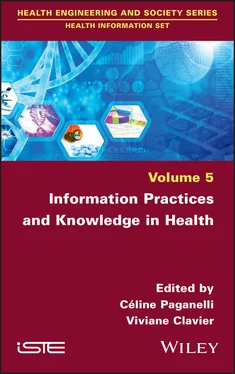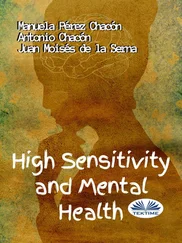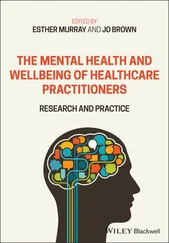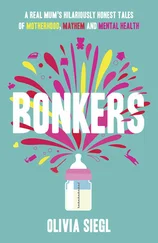Finally, the last two chapters address health information from the perspective of knowledge organization and representation.
Chapter 7presents the testimony of Dr. Four, a private practitioner specializing in ophthalmology, on the role played by professional journals in updating medical knowledge for the practice of his profession. This testimony is very instructive for research on the information practices of health professionals and on the organization of knowledge. Indeed, Dr. Four has been regularly monitoring professional journals for many years (24 years). This activity is integrated in his weekly schedule, since he devotes 15 hours of his time to reading journal articles and processing the bibliography. To practice general ophthalmology, it appears that updating knowledge is essential in many areas of ophthalmology, some of which evolve more rapidly than others. This interview is an opportunity to indicate the fields in which information is more scarce or, on the contrary, those in which it is abundant but, paradoxically, little summarized. These different cases require greater efforts in terms of information research, whether to find rare sources, summarize numerous publications or validate sources. Thus, information practices are fully integrated into medical practice and the information obtained constitutes a strong point in support of the diagnosis, assessment, treatment protocol, referral of patients to other specialists or justification of therapeutic decisions from a medical–legal point of view. This knowledge, built up and developed over time, is recorded in a document base, the organization and structuring of which are designed by and for Dr. Four’s medical practice, and is presented in detail in the chapter.
Chapter 8by Marcin Trzmielewski and Claudio Gnoli is a joint contribution on the evolution of medical knowledge organization systems (MKOS) from the 1960s to 2019. These researchers are both specialists in knowledge organization, a field of activity and research that focuses on the design, study and critique of methods for organizing and representing knowledge, most often implemented in libraries and documentation centers. Based on a review of 71 articles published in information and documentation sciences, this chapter describes the main families of MKOSs, the most represented being ontologies, thesauri and classifications. The increase in the number of publications on this subject since 1960 reflects both the vitality of the field of knowledge organization, particularly in the United States and Canada, and the strong dynamics of scientific production in medicine, and the generalization of health information on the medical Internet. Beyond the study of the structuring of concepts, the relationships between concepts, and the evolution of the various fields of medicine, this chapter presents a complete analysis of the “general public” or specialized users of MKOS. The study also focuses on the document processing process and questions the testing of specialized classifications organized by discipline in the face of interdisciplinarity. It appears that this field is still dominated by concerns related to the representation of knowledge, for which classifications also raise socio-cultural or political questions.
[AÏA 98] AÏACH P., DELANOË D. (eds), L’ère de la médicalisation. Ecce homo sanitas , Anthropos, Paris, 1998.
[AKR 12] AKRICH M., RABEHARISOA V., “L’expertise profane dans les associations de patients, un outil de démocratie sanitaire”, Santé Publique , vol. 1, no. 1, pp. 69–74, 2012.
[ARV 16] ARVEILLER J., TIZON, P., “Avant-propos : démocratie sanitaire, qu’est-ce à dire ?”, Pratiques en santé mentale , vol. 2, no. 2, p. 2, 2016.
[BAT 08] BATIFOULIER P., DOMIN, J., GADREAU M., “Mutation du patient et construction d’un marché de la santé. L’expérience française”, Revue française de socio-économie , vol. 1, no. 1, pp. 27–46, 2008.
[BEY 17] BEYALA L., Connected Objects in Health: Risks, Uses and Perspectives , ISTE Press, London and Elsevier Ltd, Oxford, 2017.
[CAB 17] CABOT C., Recherche d’information clinomique dans le Dossier Patient Informatisé : modélisation, implantation et évaluation, Computer Science PhD thesis, Normandy University, 2017.
[CAM 16] CAMBON, L., “Objets connectés, mobiles, communicants en prévention : dépasser l’outil, penser l’intervention…”, Santé Publique , vol. 28, no. 1, pp. 5–6, 2016.
[CAR 99] CARDON D., HEURTIN J.-P., “Présentation”, Réseaux , vol. 17, no. 95, pp. 9–12, 1999.
[CAS 16] CASSAN M., Rapport d’étude : usages et attentes des Français à l’égard du digital en matière d’information sur leur santé, Report, Ipsos MSD, May 2016.
[CHA 94] CHAMPAGNE P., MARCHETTI D., “L’information médicale. sous contrainte”, Actes de la recherche en sciences sociales, L’emprise du journalisme , vols 101–102, 1994.
[CRA 82] CRAWFORD R., “Healthism and the medicalization of everyday life”, International Journal of Health Services , vol. 10, no. 3, pp. 365–388, 1982.
[DEM 14] DEMAILLY L., “Variations de la ‘démocratie sanitaire’ et politique publique de santé mentale en France”, Sociologies , 2014.
[DOD 99] DODIER N., “L’espace public de la recherche médicale, autour de l’affaire de la ciclosporine”, Réseaux , Sciences, malades et espace public , vol. 17, no. 95, pp. 107–154, 1999.
[FAS 98] FASSIN D., “Avant-propos : les politiques d’une médicalisation”, in AÏACH P., DELANOË D. (eds), L’ère de la médicalisation. Ecce homo sanitas , Éditions Economica, Paris, 1998.
[GRE 19] GRENIER C., BERTRAND P., HERVE H., “Quels renouvellements conceptuels pour soutenir l’innovation dans le champ de la santé ? Un regard par les arrangements organisés, les politiques publiques et les capacités entrepreneuriales”, Innovations , vol. 60, no. 3, pp. 5–14, 2019.
[GRI 20] GRIMALDI A., “Patient expert ou patient ressource ?”, Médecine des maladies métaboliques , vol. 14, no. 6, pp. 545–548, 2020.
[LAF 20] LAFON B., “‘Our health in danger’: The extension of sanitization through media coverage of health alerts”, in PAILLIART I. (ed.), New Territories in Health , ISTE Ltd, London and John Wiley & Sons, New York, 2020.
[LEF 18] LEFEUVRE K., OLLIVIER R., La démocratie en santé en question(s) , Presses de l’EHESP, Rennes, 2018.
[LET 09] LETOURMY A., NAÏDITCH M., “L’émergence de la démocratie sanitaire en France”, Santé, Société et Solidarité , no. 2, pp. 5–22, 2009.
[MAR 17] MARGAT A., GAGNAYRE R., LOMBRAIL P. et al ., “Interventions en littératie en santé et éducation thérapeutique : une revue de la littérature”, Santé Publique , vol. 6, no. 6, pp. 811–820, 2017.
[MOR 18] MORQUIN D., OLOGEANU-TADDEI R., “The Electronic Medical Record: Standardization issues and personalization of information for health professionals”, in PAGANELLI C. (ed.), Confidence and Legitimacy in Health Information and Communication , ISTE Ltd, London and John Wiley & Sons, New York 2018.
[PAG 11] PAGANELLI C., CLAVIER V., “Le forum de discussion : une ressource informationnelle hybride entre information grand public et information spécialisée”, in YASRI-LABRIQUE E. (ed.), Les forums de discussion : agoras du XXIe siècle ? Théories, enjeux et pratiques discursives , L’Harmattan, Paris, 2011.
[POL 15] POLIQUIN H., “Analyse critique et dimensionnelle du concept de santéisation”, Aporia , vol. 7, no. 1, pp. 17–29, 2015.
[POU 09] POULAIN J.-P., Sociologie de l’obésité , Presses Universitaires de France, Paris, 2009.
Читать дальше












